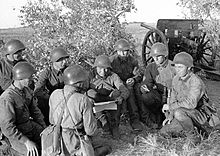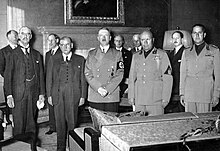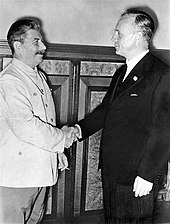![]() Publicado em Georgia - Entreterimento e interações sociais - 10 Jun 2016 03:45 - 1
Publicado em Georgia - Entreterimento e interações sociais - 10 Jun 2016 03:45 - 1
Soviet-Japanese border conflictsIn the mid-to-late 1930s, Japanese forces in Manchukuo had sporadic border clashes with the Soviet Union and Mongolia. The Japanese doctrine of Hokushin-ron, which emphasised Japan's expansion northward, was favoured by the Imperial Army during this time. With the devastating Japanese defeat at Khalkin Gol in 1939 and ally Nazi Germany pursuing neutrality with the Soviets, this policy would prove difficult to maintain. Japan and the Soviet Union eventually signed a Neutrality Pact in April 1941, and Japan adopted the doctrine ofNanshin-ron, promoted by the Navy, which took its focus southward, eventually leading to its war with the United States and the Western Allies. Red Army Artillery, 1938
Red Army Artillery, 1938
European occupations and agreementsIn Europe, Germany and Italy were becoming more aggressive. In March 1938, Germany annexed Austria, again provoking little responsefrom other European powers. Encouraged, Hitler began pressing German claims on the Sudetenland, an area of Czechoslovakia with a prinantly ethnic German lation; and soon Britain and France followed the counsel of British Prime Minister Neville Chamberlainand conceded this territory to Germany in the Munich Agreement, which was made against the wishes of the Czechoslovak government, in exchange for a promise of no further territorial demands. Soon afterwards, Germany and Italy forced Czechoslovakia to cede additional territory to Hungary and Poland.Although all of Germany's stated demands had been satisfied by the agreement, privately Hitler was furious that British interference had prevented him from seizing all of Czechoslovakia in one operation. In subsequent speeches Hitler attacked British and Jewish "war-mongers" and in January 1939 secretly ordered a major build-up of the German navy to challenge British naval supremacy. In March 1939, Germany invaded the remainder of Czechoslovakia and subsequently split it into the German Protectorate of Bohemia and Moraviaand a pro-German client state, the Slovak Republic. Hitler also delivered an ultimatum to Lithuania, forcing the concession of theKlaipėda Region. Chamberlain, Daladier, Hitler,Mussolini, and Ciano pictured just before signing the Munich Agreement, 29 September 1938
Chamberlain, Daladier, Hitler,Mussolini, and Ciano pictured just before signing the Munich Agreement, 29 September 1938
Greatly alarmed and with Hitler making further demands on the Free City of Danzig, Britain and France guaranteed their support for Polish independence; when Italy conquered Albania in April 1939, the same guarantee was extended to Romania and Greece. Shortly after theFranco-British pledge to Poland, Germany and Italy formalised their own alliance with the Pact of Steel. Hitler accused Britain and Poland of trying to "encircle" Germany and renounced the Anglo-German Naval Agreement and the German–Polish Non-Aggression Pact.In August 1939, Germany and the Soviet Union signed the Molotov–Ribbentrop Pact, a non-aggression treaty with a secret protocol. The parties gave each other rights to "spheres of influence" (western Poland and Lithuania for Germany; eastern Poland, Finland, Estonia, Latvia andBessarabia for the USSR). It also raised the question of continuing Polish independence. The agreement was crucial to Hitler because it ured that Germany would not have to face the prospect of a two-front war, as it had in World War I, after it defeated Poland.The situation reached a general crisis in late August as German troops continued to mobilise against the Polish border. In a private meeting with the Italian foreign minister, Count Ciano, Hitler erted that Poland was a "doubtful neutral" that needed to either yield to his demands or be "liquidated" to prevent it from drawing off German troops in the future "unavoidable" war with the Western democracies. He did not believe Britain or France would intervene in the conflict. On 23 August Hitler ordered the attack to proceed on 26 August, but upon hearing that Britain had concluded a formal mutual istance pact with Poland and that Italy would maintain neutrality, he decided to delay it.In response to British requests for direct negotiations to avoid war, Germany made demands on Poland, which only served as a pretext to worsen relations. On 29 August, Hitler demanded that a Polish plenipotentiary immediately travel to Berlin to negotiate the handover of Danzig, and to allow a plebiscite in the Polish Corridor in which the German minority would vote on secession. The Poles refused to comply with the German demands and on the night of 30–31 August in a violent meeting with the British ambador Neville Henderson, Ribbentrop declared that Germany considered its claims rejected. German Foreign MinisterRibbentrop and the Soviet leader Joseph Stalin, after signing the Molotov–Ribbentrop Pact, 23 August 1939
German Foreign MinisterRibbentrop and the Soviet leader Joseph Stalin, after signing the Molotov–Ribbentrop Pact, 23 August 1939
 Red Army Artillery, 1938
Red Army Artillery, 1938European occupations and agreementsIn Europe, Germany and Italy were becoming more aggressive. In March 1938, Germany annexed Austria, again provoking little responsefrom other European powers. Encouraged, Hitler began pressing German claims on the Sudetenland, an area of Czechoslovakia with a prinantly ethnic German lation; and soon Britain and France followed the counsel of British Prime Minister Neville Chamberlainand conceded this territory to Germany in the Munich Agreement, which was made against the wishes of the Czechoslovak government, in exchange for a promise of no further territorial demands. Soon afterwards, Germany and Italy forced Czechoslovakia to cede additional territory to Hungary and Poland.Although all of Germany's stated demands had been satisfied by the agreement, privately Hitler was furious that British interference had prevented him from seizing all of Czechoslovakia in one operation. In subsequent speeches Hitler attacked British and Jewish "war-mongers" and in January 1939 secretly ordered a major build-up of the German navy to challenge British naval supremacy. In March 1939, Germany invaded the remainder of Czechoslovakia and subsequently split it into the German Protectorate of Bohemia and Moraviaand a pro-German client state, the Slovak Republic. Hitler also delivered an ultimatum to Lithuania, forcing the concession of theKlaipėda Region.
 Chamberlain, Daladier, Hitler,Mussolini, and Ciano pictured just before signing the Munich Agreement, 29 September 1938
Chamberlain, Daladier, Hitler,Mussolini, and Ciano pictured just before signing the Munich Agreement, 29 September 1938Greatly alarmed and with Hitler making further demands on the Free City of Danzig, Britain and France guaranteed their support for Polish independence; when Italy conquered Albania in April 1939, the same guarantee was extended to Romania and Greece. Shortly after theFranco-British pledge to Poland, Germany and Italy formalised their own alliance with the Pact of Steel. Hitler accused Britain and Poland of trying to "encircle" Germany and renounced the Anglo-German Naval Agreement and the German–Polish Non-Aggression Pact.In August 1939, Germany and the Soviet Union signed the Molotov–Ribbentrop Pact, a non-aggression treaty with a secret protocol. The parties gave each other rights to "spheres of influence" (western Poland and Lithuania for Germany; eastern Poland, Finland, Estonia, Latvia andBessarabia for the USSR). It also raised the question of continuing Polish independence. The agreement was crucial to Hitler because it ured that Germany would not have to face the prospect of a two-front war, as it had in World War I, after it defeated Poland.The situation reached a general crisis in late August as German troops continued to mobilise against the Polish border. In a private meeting with the Italian foreign minister, Count Ciano, Hitler erted that Poland was a "doubtful neutral" that needed to either yield to his demands or be "liquidated" to prevent it from drawing off German troops in the future "unavoidable" war with the Western democracies. He did not believe Britain or France would intervene in the conflict. On 23 August Hitler ordered the attack to proceed on 26 August, but upon hearing that Britain had concluded a formal mutual istance pact with Poland and that Italy would maintain neutrality, he decided to delay it.In response to British requests for direct negotiations to avoid war, Germany made demands on Poland, which only served as a pretext to worsen relations. On 29 August, Hitler demanded that a Polish plenipotentiary immediately travel to Berlin to negotiate the handover of Danzig, and to allow a plebiscite in the Polish Corridor in which the German minority would vote on secession. The Poles refused to comply with the German demands and on the night of 30–31 August in a violent meeting with the British ambador Neville Henderson, Ribbentrop declared that Germany considered its claims rejected.
 German Foreign MinisterRibbentrop and the Soviet leader Joseph Stalin, after signing the Molotov–Ribbentrop Pact, 23 August 1939
German Foreign MinisterRibbentrop and the Soviet leader Joseph Stalin, after signing the Molotov–Ribbentrop Pact, 23 August 1939Patrocinador
Comentários (1)



